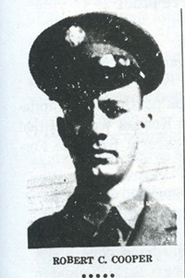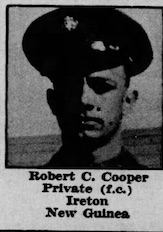IRETON HONORS YOUNG SOLDIER
Flags Flown At Half Mast This Week
Ireton residents were shocked on Monday morning to hear of the death of Robert C. Cooper, popular Ireton boy and eldest son of Mr. and Mrs. Cecil Cooper.
Mr. and Mrs. Cooper were notified of his death by a telegram from the War Department stating that their son had “died February 17, from wounds received in action.”
Robert Clayton Cooper was born August 30, 1918, received his education in the Ireton public school, graduating from high school in 1936.
He was inducted into the Army on November 6, 1941, at Fort Des Moines and was stationed at Camp Walters, Texas, where he received four months basic training.
From there he was sent to Fort Lewis, Washington, and left for an unknown destination in May, 1942. He landed in Australia early in June and was transferred to the New Guinea area less than a month before his death.
He is survived by a brother, Cecil Jr., who is stationed at Pearl Harbor as a navy seaman, as well as his parents.
Bob was the second Ireton boy to die in this present war and he was the first to die in action overseas. Ted Sneiders lost his life in an airplane accident at Houston, Texas.
B. E. Holtdorf, mayor of Ireton, has ordered all flags in the town of Ireton flown at half-mast for the week in memory of one of the finest boys who ever lived in Ireton and whose loss will be felt by a host of friends and relatives.
Source: LeMars Sentinel, March 9, 1943
![]()
Mother of Ireton War Victim Gets Captain’s Letter
Impressive Funeral Described—Body Rests Near Ocean
Hawarden Independent: Robert C. Cooper, Ireton youth who was killed in action in New Guinea on February 17, died a hero’s death that saved the lives of other American soldiers.
In a letter to the mother, Mrs. C. C. Cooper, of Ireton, Captain Wm. C. Henske, who was in command of the portable hospital of Cooper’s regiment, states definitely that Cooper’s death saved other American boys from being maimed or killed.
Death, reports Capt. Henske, was instantaneous and was caused by an enemy explosive which entered and ruptured Cooper’s heart.
Capt. Henske wrote an interesting report of the funeral services held for Cooper, with full military honors. The letter follows:
Capt. Wm. C. Henske
20th Portable Hospital
Feb. 19, 1943
Dearest Bereaved Mother:
Your son died instantaneously from an enemy explosive which entered and ruptured his heart Feb. 17, 1943, at about 4:30 p.m. He was brought to our surgery where his body was prepared and rested overnight. His death undoubtedly has been the cause of saving other boys from being killed or maimed.
Packed In Rare Herbs.
Immediately the next morning after a beautiful tropical sunrise, the natives brought in a casket that they had made. In the bottom of the casket to the depth of several inches, they had placed foliage and sweet smelling herbs for which they had scoured the country and jungle about here. Your son was then reverently placed by some of his comrades in the coffin. The natives then packed some more herbs and foliage about Robert’s body. The casket was sealed and different kinds of ferns and foliage remarkable for their beauty were placed about a foot thick over the top.
The sides of the casket were covered by beautifully woven palm leaves. Then a large silk American flag was draped over all. The whole was lifted to the shoulders of six stalwart natives picked for their manliness and beautiful stature. He was then carried in a small procession of officers and men thru files of soldiers at the salute to the battalion chapel. Here his body rested in state, guarded by soldiers with fixed bayonets, one on either side of the casket. He rested in state.
At 2 p.m. Feb. 18, 1943, a military funeral was held. The chapel, a beautiful tropical affair, was filled to capacity by officers and hundred of his friends and companions, who came to mourn his loss.
The services were conducted by the divisional chaplain, the regimental chaplain, and the battalion chaplain. Each one spoke and a resume of your son’s civilian and military career was made. Three songs were sung accompanied by the field organ. After the services, the casket was borne on the shoulders of six of his comrades and a procession was formed. It was led by the chaplains, followed by the honorary pall bearers and rifle squad, then the casket, then the colonel and his staff and officers and then a whole contingent of about three hundred soldiers; all marching in somber military manner. This cortege wended its way on a train to a small American cemetery about a fifth of a mile from the chapel. At the grave prayers were said by the chaplains. The firing squad fired the salute of three rounds. Taps were blown by the bugler and your son was consigned to his grave amidst the prayers of the chaplains.
The grave yard is about a hundred yards from the beautiful Pacific Ocean and the surrounding area is truly beautiful to behold with a vast mountain range towering in the distance.
With the kindest of heartfelt sympathy from his officers and comrades, we wish you comfort in the knowledge that your son did not give up his life in vain.
Sincerely, Wm. C. Henske
P.S. A few incidents may not be amis:
The Australian officer who had charge of the natives ordered the coffin made. The natives, who can neither read nor write, constructed it of Japanese woods. [Transcriber Note—there is another paragraph but the film copy is obscured, not able to transcribe.]
Source: LeMars Globe-Post, March 22, 1943
![]()
Ireton, Iowa: A Purple Heart award has been received here by Mr. and Mrs. C. C. Cooper for the valor while in the line of duty of their son, Robert Cooper who died February 17, 1943, according to word received from the war department. Private Cooper was with Gen. MacArthur’s forces at New Guinea. Besides his parents he is survived by a brother, Cecil, in the navy.
Source: The Sioux City Journal, April 14, 1943
![]()
Parents Receive Pictures Of Soldier Son Taken In Australia
Arrive At Cooper House At Ireton In Time For Mother’s Day
Mr. and Mrs. C. C. Cooper received a group of photographs from Australia this last Wednesday of their son, Robert, which he had taken before he left that continent for New Guinea where he met his death Feb. 17, 1943, while in action with General MacArthur’s forces. The pictures had been taken upon his arrival in an Australian port nearly a year ago and he had written to his parents about them as late as last January. It is coincident that they arrived at the home of Mr. and Mrs. Cooper in time for Mother’s Day.
Source: LeMars Globe-Post, May 6, 1943
![]()
Iowa’s World War II Honor Roll
These Iowans, like the ones pictured in this section last Sunday, have given their lives for their country. They came from all sections of the state, from all walks of life, and they rest today in strange and far away but never-to-be forgotten places. The final line beneath each photograph tells the geographical area in which the man was serving. Additional pictures of Iowans who have been killed in combat will be carried on future Sundays.
Source: The Des Moines Register, Sunday, December 12, 1943 (photo included of Robert C. Cooper)
![]()
LEST WE FORGET
Robert C. Cooper was born in Ireton, Iowa, Aug. 18, 1918, and attended the local school and grew to young manhood here. He was graduated from the Ireton High School with the Class of 1936. Shortly there after he was employed at Hawarden. He enlisted in the Military Service in November 1941 and following his basic training sent to the Pacific War area. He was critically wounded while in New Guinea and died February 17, 1943.
Survivors include his parents, Mr. and Mrs. Cecil C. Cooper, Sr. of Ireton, one brother Cecil Cooper Jr., of Greenville, Ohio, and his grandparents, Mr. and Mrs. J. A. Lindenman, of Ireton.
~Source: Ireton Ledger, Thursday, May 30, 1946 (photo included)
![]()
NOTE: On the first Memorial Day following the end of the war, the Ireton Ledger paid tribute to the Ireton community’s casualties under the headline, “Lest We Forget.”
![]()
The body of Robert Clayton Cooper was returned to the U.S. for burial in 1948 at the Pleasant Hill Cemetery, Ireton, IA.
Source: ancestry.com
![]()


